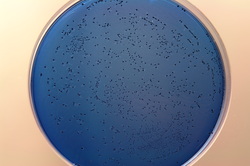UAB Bioseka will be attending the 8th Annual International Partnering Conference Bio-Europe Spring® 2014 in Turin (Italy) on March 10-12, 2014. UAB Bioseka will present the antisense technology for the R&D and commercialization partners. UAB Bioseka is open for meetings with other companies and investors, interested in developing antisense antimicrobials technology and cooperating in other R&D and commercialization projects.
 Hospital acquired infections, antibiotic-resistance and non-selective antibiotic action are pressing needs on the health systems worldwide. Novel antibacterials are urgently needed to combat the bacterial pathogens, which are increasingly resistant to existing antibiotics. UAB Bioseka together with the Faculty of Medicine of Vilnius University and Israeli company GeneArrest Ltd are developing novel antimicrobial biotechnology for the treatment of life-threatening infections. Scientists from Lithuania and Israel are applying the advanced antisense oligonucleotide therapy method based on peptide nucleic acid (PNA) oligonucleotides. The technology focuses on the biofilm synthesis in bacteria that cause or contribute to the most of the infections. UAB Bioseka together with partners have commenced joint R&D project “Peptide Nucleic Acid Applications for Inhibition of Streptococci Biofilms” (PAISBI) as of November 2013. The project was well evaluated and received funding under the EU EUREKA Programme, and is partially funded by the Agency for Science, Innovation and Technology (MITA) in Lithuania. Dr Tomas Kačergius, science director of UAB Bioseka explains: “Existing anti-bacterial technology is inadequate, it is not selective enough, and therefore threatens the environment and the "good bacteria". This is our motivation to create new tools that affect only “bad bacteria” – that is, only the cause of the disease." Zita Aušrelė Kučinskienė, Member of the Lithuanian Academy of Sciences, Professor and Head of the Department of Physiology, Biochemistry, Microbiology and Laboratory Medicine of the Faculty of Medicine of Vilnius University, seconds that: “Bacterial resistance to antibiotics is a global problem. This problem can be effectively solved only by a new generation biotechnology. We feel proud that such technology is being developed in Lithuania.” Unfortunately, statistics on antibiotic-resistant infections in Lithuania is not public. In the U.S. experience by conservative estimate at least 2 million people were infected with antibiotic-resistant pathogens in 2013 infections and more than 23 000 outcomes were fatal. Even if the infection is treated, it may result in permanent damage and disability. Bacterial infections are a common complication for many medical procedures. Even simple interventions such as a dental implant may introduce oral or skin bacteria to the deeper tissue resulting in implant rejection and repeat surgery, which sometimes can be very complex or even impossible. Over the past decade, bacterial infections became resistant to the last resort antibiotics – carbapenems. Carbapenem resistance has emerged in Asia and spread all over the world. Antibiotic resistance is horizontally transferred among different species of bacteria – one species transfer resistance genes to other species. The threats are demonstrated by the deadly outbreak of multi-drug resistant enterobacterial infections in Hamburg, Germany in 2012. Resistance is rapidly spreading to bacteria, which used to be easily treated, such as Neisseria gonorrhoeae. Most existing antibiotics are not selective, which means that they are wide spectrum and kill all bacteria, including the "good bacteria.” Normal microbiota – the "good bacteria" – are essential for the healthy immune system, and damaging it can be very dangerous. The place of “good bacteria” is immediately occupied by the other bacteria, including potential pathogens. In the normal environment we are attacked by about 20 000 different pathogens daily, of which at least a quarter are pathogenic. Moreover, the “good bacteria” can quickly turn deadly by acquiring few genes encoding toxins. For these reasons, it is important that new antibacterial agents are very selective, and only the “bad” disease-causing bacteria are affected by the therapy, preserving the natural microbiota. Selectivity is possible, if bacteria are controlled at the DNA and RNA by focusing on the genes or their transcription in the “bad bacteria” only. Such novel approach of antimicrobial biotechnology based on selective DNA and RNA inhibition is being developed by UAB Bioseka. Antisense oligonucleotides are single stranded fragments of genetic information, which regulate cells at the DNA and RNA level. More specifically oligonucleotide biotechnology binds to the iRNA and blocks protein synthesis in cells. PNA oligonucleotides also bind directly to the bacterial DNA thus preventing the transcription of the gene and reducing viability of the bacteria. R&D project “Peptide Nucleic Acid Applications for Inhibition of Streptococci Biofilms” (PAISBI) was initiated by UAB Bioseka and focussed on pathogenic streptococci. Streptococci are responsible for the grave infections of the cardiovascular system, respiratory tract, nasopharynx and skin. For example, Streptococcus pneumoniae is the common cause of sinusitis, pneumonia and even meningitis. Partners in the project are the scientists of the Faculty of Medicine of Vilnius University, who help in testing the new technology, as well as Israeli company GeneArrest Ltd, which is contributing unique PNA olignucleotide synthesis and optimization expertise. Synergy of the technologies developed by UAB Bioseka and GeneArrest Ltd enables exciting possibilities for novel antibacterial agents. Dr Austė Kiškienė, CFO of UAB Bioseka, is pleased that Bioseka’s existing technology was appreciated by partners and international experts. “UAB Bioseka is focused on the development of highly innovative biotechnology products and global market opportunities. International co-operation in this project demonstrated that our professionals have worldwide recognition. We are excited on the synergistic possibilities of the combined technology and expertise in the project. The technology has already generated interest from the U.S.” - explains Dr. A. Kiškienė. The project shall last for two years. Companies plan to license the technology for clinical trials and use in medicinal products. |
AutoriusUAB Bioseka Archyvas
October 2023
|

 RSS Feed
RSS Feed
